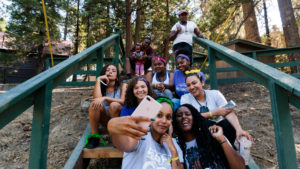Lead With Your Brokenness
As a leader, it becomes almost too easy for us to pull rank, boast about our strengths or titles when it comes to our relationships with both volunteers and students. I can hear it in my head now, “I’m the leader, so you have to do what I say.” To be quite honest with you, there are definitely some moments throughout the course of my leadership that I have felt the need to pull rank in how I was communicating with students and volunteers.
I have found over time when it comes to working with youth rarely does the alpha role work in leading students. Do not get me wrong, I do think there are moments when you need it but more often than not, I have seen it backfire on the people who feel they can do it. What makes it worse is the volunteers that I lead begin to follow my example and lead this way.
This past summer I took a group of students and leaders to a weekend camp for a get away from the busyness of life and for a chance to have an encounter with God. The first day I noticed that some of the volunteers were playing the alpha role with the students. As they took on this alpha posture, their body language and tone were, in essence, saying “sit down and shut up, I am the leader here.”
As you and I know, students do not like to be dominated nor feel like they are prey. The students began to respond back with the typical, ‘you ain’t my momma!’ response that only an urban youth can do correctly. I knew that as their leader and being on the same team we were going to have to deal with their leadership immediately. So rather than call for a big meeting and play the alpha role with my leaders, I decided that I would lead with my brokenness and show the leaders how to do the same.
After the message that night I asked my leaders to come to the front of the stage. Immediately they came up thinking I wanted them to pray and counsel the students that were coming up behind them. Not so. Instead, I explained very thoroughly that none of us are without issues. It is hypocritical of us to ask the students to come to the front and we aren’t willing to do the same. Immediately something shifted in the room.
For the first time maybe ever, the leaders went from being leaders to being the receivers. The students not only realized that the leaders needed just as much help as they do but their respect level actually went up for the leaders because of their ability to lead with their brokenness.
“People tend to respect you more when you are vulnerable about your own junk before trying to deal with theirs.” – Jose
Being vulnerable does not just work for students, but it has worked on several occasions as I lead volunteers. My ability to share my pain and brokenness gave me leverage to lead people further. Your pride will lead to you hiding your issues and this could be the very thing that keeps you from being a good leader.
Here are three quick ways to lead with your brokenness.:
- Kill your own ego – I cannot tell you how many leaders continue to have barriers between them, their volunteers and students simply because of their ego. If God resists the proud, people will too. (Side note: E.G.O. stands for Edging. God. Out. and when you edge God out, you automatically edge people out.)
- Expose your weakness – It should already be clear that you are a leader. What is not clear is that you are human just like those you are connected to. Nobody wants to follow a perfect leader because there is no way they can attain such perfection.
- You go first – You have to model this behavior before you ask anybody else to do the same. If you are willing to be broken and vulnerable it would be much easier to get students to open up about their brokenness and vulnerability. It is hypocritical to want others to open up without you doing so first.
I want to leave you with a challenge. I want you to evaluate your leadership style with these two questions: Are you the boss type leader? Do you have the alpha role syndrome? Are you the vocal leader? No matter what kind of leadership style you have, the way for you to be an effective leader is by leading with your brokenness. When you lead with yours, others will follow with theirs and then everyone can get the help that’s needed and get to the destination. People need your vulnerability!


